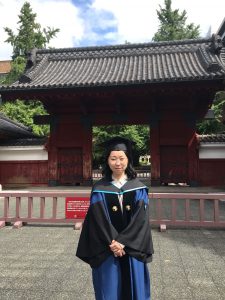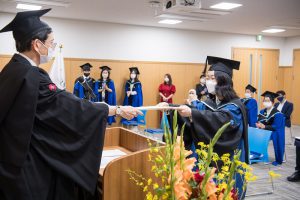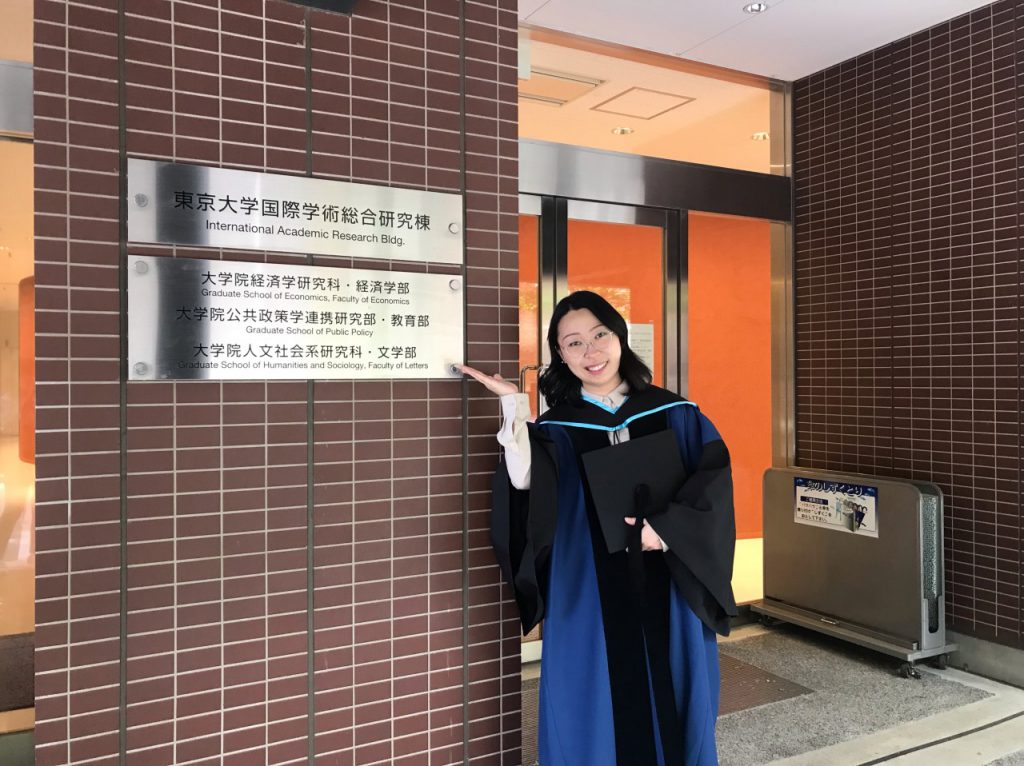Finding a place to continue academic learning in economic theories as well as learning and practicing the process of policymaking
After finishing the master’s course in the Graduate School of Economics at UTokyo, I realized I was interested in the real-life application of economic theories. When I chose graduate schools to pursue my Ph.D. degree, I looked for a place where I could continue academic learning in economic theories, and more importantly, could learn and practice the process of policymaking. At GraSPP, I believe I could manage both sides. GraSPP has distinguished professors in academia in economics, international relations, laws, etc, and also has famous practitioners specializing in monetary policy, diplomacy, energy, etc. Meanwhile, GraSPP has a very diversified group of students, with different research backgrounds, countries, and career paths. There are young students like me and experienced young government officials in emerging countries such as India, Cambodia, Mongolia, and Brazil. Lastly, GraSPP has many courses and workshops to talk to practitioners and work with students to simulate the policy-making process. In a word, entering GraSPP was my optimal decision for academic study and future career plans.
Four attractive points about GraSPP

The first and foremost attracting point about GraSPP is the faculty members. Since many professors in GraSPP are affiliated with more than one graduate school, I can still choose courses from GSE and, as a matter of fact, my advisor is also affiliated with GSE. What’s more interesting, I can choose courses in other fields and discuss my research from a very different angle, such as international relations.
The second point is the diversified PhD cohort and our very close communication. In my cohort, there are doctoral students doing research in economics, international relations, politics, law, etc. Doctoral students have two compulsory courses, Project Seminar and Research Design Seminar, we present our research to each other although we may have very different research backgrounds. It is always fun and extremely important to practice appealing my research to someone other than students and professors in economics. Before the pandemic, we occasionally had get-togethers with some professors to talk about life, research, and other interesting stuff.
The third point is seminars, workshops, and conferences. Policymakers, researchers, private sector CEOs, and NGOs are invited to give speeches and answer questions. These are valuable opportunities to observe the real-world economic condition and fill in the gap between theory and reality.
The last point is the kind and sweet GraSPP admin office. I sincerely want to thank our admin office for the clear and quick response to every request. They always consider the problem from the perspective of students and help us solve problems, sometimes even personal issues. They send gentle reminder emails for activities. They remind us of deadlines in case we forget. There are so many warm gestures of our dear admin staff that I cannot list them all.
Advantages of studying in Japan: Focusing on research at one of the top universities in Asia
Regarding economics, Japan is one of the leading advanced economies in Asia, and UTokyo is one of the top universities. In addition, given the strong connection between UTokyo and Japanese policymakers, and the communications between UTokyo and other world top universities, there are many opportunities to hear the latest topics in both industries and academia.
As a Ph.D. or master’s student, I think Japanese universities are a nice place to purely focus on research. Based on my experience at UTokyo, professors do not take a crowd of students to supervise. We do not have “drama” here, students are genuinely interested in research. Also, we have a regular weekly seminar (or case study class) to report on research progress. Students can get feedback and see their progress week by week, step by step.
Regarding the culture, Japan is a very attractive country, from traditional Japanese culture to modern arts. In extracurricular activities, there are always exhibitions to go to relax.
Getting more interested in IMF through offering courses
 Regarding the study of economics, apart from the core courses, Macro Contract Theory and Empirics, Monetary Policy, and Financial System helped me to consolidate knowledge in my research areas in macroeconomics and financial economics. In terms of practical courses, International Field Workshop and International Organizations for Sustainable Development in the 21st Century gave me opportunities to meet people who worked in IMF, World Bank, Brookings Institute, UN, IEA, OECD, and other international organizations. Such experience gave me a clear image of the work and the working style of international organizations.
Regarding the study of economics, apart from the core courses, Macro Contract Theory and Empirics, Monetary Policy, and Financial System helped me to consolidate knowledge in my research areas in macroeconomics and financial economics. In terms of practical courses, International Field Workshop and International Organizations for Sustainable Development in the 21st Century gave me opportunities to meet people who worked in IMF, World Bank, Brookings Institute, UN, IEA, OECD, and other international organizations. Such experience gave me a clear image of the work and the working style of international organizations.
GraSPP has a big influence on my career decision. The course I took made me interested in IMF and the professors gave me advice and shared their experiences when I prepared for the interview at IMF OAP. I have no doubt that one of the main reasons I succeeded in the interview is what I have learned in GraSPP.
Last but not least…
GraSPP is a great place to embrace diversity, and an exciting place full of opportunities. It’s okay to be confused or anxious. Keep an open mind, be brave to try everything, and you will surely find the job/research you are passionate about.



